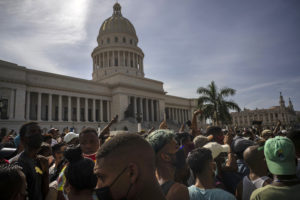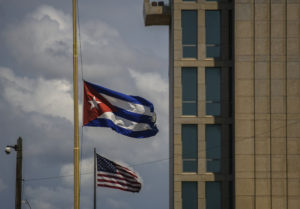In the coming weeks, perhaps as soon as this Friday, June 16, President Trump is expected to announce a reversal of the Obama administration’s opening with Cuba by reinstating limits on travel and commerce. In announcing these changes, the Trump administration is likely to cite the human rights situation in Cuba as justification for a more punitive approach.
“The Trump administration is taking exactly the wrong approach if it really wants to spur improvements in the human rights climate in Cuba. This reversal is fundamentally misguided,” said WOLA Senior Associate for Cuba Marguerite Jiménez.
The Washington Office on Latin America (WOLA), a leading research and advocacy organization advancing human rights and social justice in the Americas, has long opposed the U.S. embargo on Cuba. The embargo includes a sweeping set of sanctions that harm the health and well-being of Cuban civilians. The sanctions have failed to stimulate or incentivize political reforms in Cuba; in fact, they have been, if anything, counterproductive in regard to human rights issues. They have damaged U.S. standing in the hemisphere, and hurt both U.S. economic and security interests unnecessarily. For all these reasons, WOLA has applauded the steps taken in the last few years to ease economic sanctions. Engagement with Cuba will serve U.S. interests, and encourage greater openness on the island.
Today, the Trump Administration appears ready to argue that the best way to support a political opening in Cuba is for the United States to demand human-rights concessions as a condition of engagement. This is not just a bad negotiating strategy. It also represents a fundamental misunderstanding of how the United States can most effectively influence Cuba’s political and social future.
Rather than make demands Cuba is sure to reject, engagement aims to create conditions that provide Cuban leaders with self-interested reasons to allow greater political and economic freedom. Building bilateral economic ties creates the incentive for Cuba to maintain an open flow of people and ideas, and to be more responsive to U.S. and international concerns on a whole range of issues, including human rights.
Returning to a policy of hostility will increase tensions and reduce the space for reform in Cuba, harm U.S. interests and relationships in the region, and do little more than make the lives of everyday Cubans more difficult. Moreover, this decision is driven not by a judgement about what will make a difference in Cuba, but by domestic politics and a diminishing but still vocal minority in the United States. It is being made without any facts or actual evidence to justify it.
“There is no question that Cuba ought to do more to permit its citizens’ full freedom of expression and association. WOLA has been, and continues to be, critical about the restrictions that the Cuban government imposes. However, a return to failed policies of the past will inevitably halt progress and only make life more difficult for Cubans on the island. The willingness to engage on equal terms is the only avenue to encourage transformational social and economic changes over the long term,” said Marguerite Jiménez.
Since 2014, the United States and Cuba have been able to sign more than twenty memorandums of understanding ranging from trade to environmental cooperation. Cuba has seen an increase in U.S. visitors and calls for more open debate about Cuba’s problems have led Cuban intellectuals to launch spirited discussions to tackle sensitive topics like inequality, racial discrimination, the role of religion, and the nature of socialist democracy on various print and digital platforms. Although not widely available, internet use has increased in Cuba, with progress on all indicators of internet freedom—internet penetration, obstacles to access, limits on content, and violation of the rights of users. More engagement, not a return to failed policies of the past, is what is needed in the U.S. policy toward Cuba.
Whatever the Trump administration does, WOLA will continue to advocate for policies of engagement, continuing the critical work of building bridges between peoples in both countries. The fifty-year-old embargo against Cuba and new Trump era policies will fail to promote human rights or democracy and instead will isolate the United States from the region and the world.


